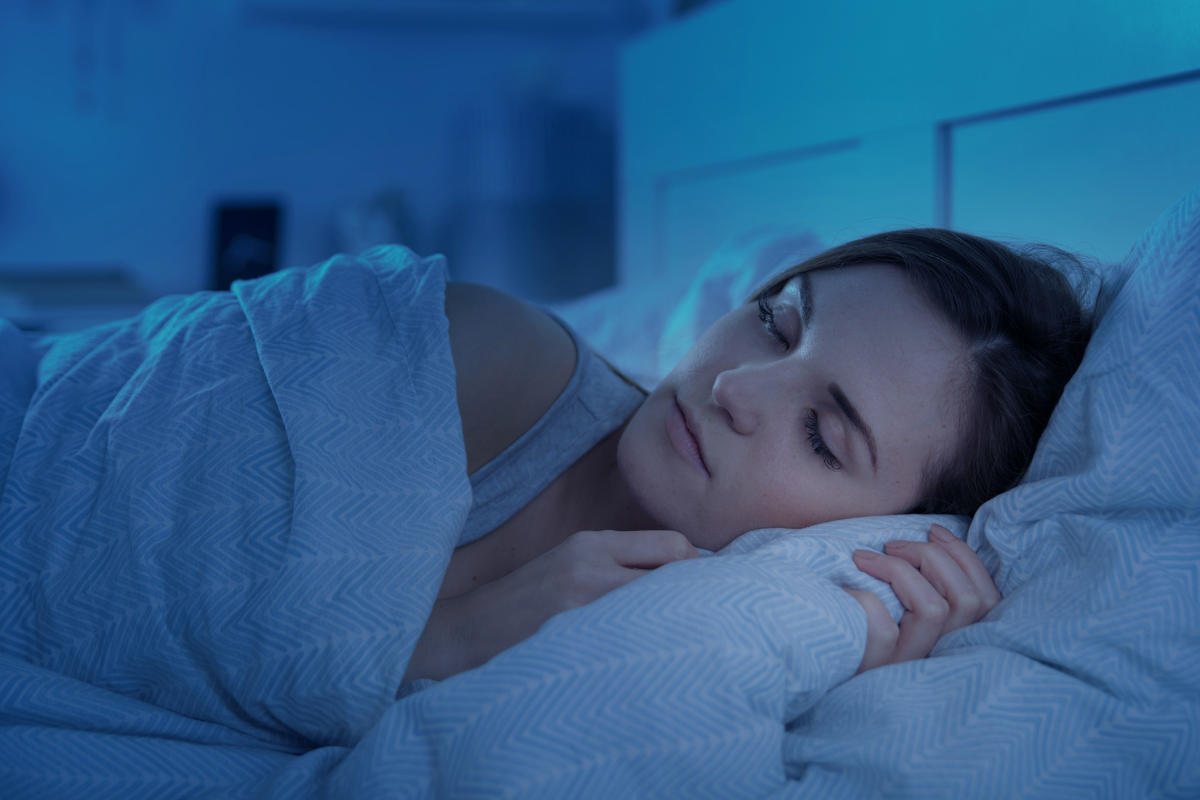When it comes to improving your sleep, it can be hard to know where to start. Once you realize that the quality or quantity of your sleep is not where you want it to be, it may be tempting to change everything all at once. But often, it is more sustainable to start small with better daily habits.
We highlight the top sleep tips to add to your daily routine. By slowly building a routine that includes these healthy sleep tips, you will likely start to see your sleep improve. These tips go beyond what you do right before you go to bed. Building a healthy routine for better sleep includes paying attention to what you do during the day, too.
Our Best Tips for Better Sleep
We take a closer look at how changes to your daily wellness, sleep routine, and bedroom environment can make it easier to fall asleep at night and feel well rested in the morning. Whether the proposed change to your daily routine is big or small, there is science behind each habit we highlight.
While getting better sleep is a common goal, there are many different reasons for why your sleep may need improvement. These tips for better sleep can help you build a personalized plan that fits your lifestyle.

Daily Wellness
What you do during the day can affect your sleep at night. These wellness tips focus on daily activities, from finding time to get outside to how you plan your meals.
- Get at least 30 minutes of exposure to daylight.
- Why it matters: Natural light influences your body’s circadian rhythm, which directly affects when you feel sleepy. Early exposure to daylight can help align your sleep-wake pattern and make it easier to sleep at night.
- What you can do: Step outside early in the morning if you can, whether it is with your morning cup of coffee or as part of your commute. Letting natural light in through the windows can also help. Aim for at least 30 minutes of natural light exposure each day.
- Go to bed and wake up at the same times every day.
- Why it matters: A consistent schedule has been linked with improved sleep, and the timing of everyday activities, such as meals, can impact sleep patterns.
- What you can do: Set a consistent wake-up time and start your day with the same routine. Have breakfast, lunch, and dinner around the same times every day. End your day with a consistent bedtime routine.
- Limit naps to 20 minutes in the early afternoon.
- Why it matters: A nap in the late afternoon or evening can reduce how tired you feel at night, which may make it harder to fall asleep at bedtime.
- What you can do: If you decide to nap, limit it to 20 minutes and schedule it for eight or more hours before your bedtime.
- Boost your diet with fruits, vegetables, and whole grains.
- Why it matters: Vitamins and nutrients enable the body to function properly, and studies have found an association between sleep and nutrition. A balanced diet of fruits and vegetables, whole grains, and lean meat may support better sleep health.
- What you can do: As everyone has different needs, speak to your doctor or a nutritionist about your current diet and how it could be improved.
- Calm your mind with deep breathing and visualization.
- Why it matters: Stressful moments are inevitable, but whether they affect sleep depends on how you respond to them. Learning relaxation techniques can improve resilience and limit the impact of stress on sleep.
- What you can do: Experiment with different relaxation methods like deep breathing and visualization to see which ones work best for you. Practicing these techniques during the day can help prepare you to use them at bedtime.

Sleep Routine
Your sleep routine can affect how well you sleep. Developing a healthy nightly routine can provide a foundation for more consistent and restful sleep.
- Get at least seven hours of sleep each night.
- Why it matters: Getting at least seven hours of sleep Trusted Source National Library of Medicine, Biotech Information The National Center for Biotechnology Information advances science and health by providing access to biomedical and genomic information. View Source each night is essential for overall health and well-being. A full schedule of activities can eat away at time needed for sleep. If you do not dedicate enough time to rest, it is inevitable that you will end up getting insufficient sleep.
- What you can do: You can use a sleep calculator to find your ideal sleep and wake times. If you need to shift your bedtime to allow for more sleep, gradually adjust your schedule by 15 to 30 minutes per night until you reach the desired bedtime.
- Follow the same pre-bed routine each night.
- Why it matters: Having the same sequence of steps to prepare for bed can signal to your body and mind that it is almost time to sleep. Your routine should help you feel ready for bed.
- What you can do: Tailor your nightly routine to suit your own needs and preferences. You may want to put on comfortable pajamas, brush your teeth, do a relaxing activity, then turn out the lights. Complete the steps of your routine in the same order every night.
- Reduce stress with calming activities.
- Why it matters: Decreasing stress can help settle your mind and body so that you can transition smoothly into sleep. Knowing how to calm your mind may also make it easier to get back to sleep if you wake up during the night.
- What you can do: Common approaches to relieving stress include deep breathing, journaling, stretching, reading, meditating, or listening to ambient music. You may need to try a few different activities to find the right fit.
- Only use your bed for sleep and sex.
- Why it matters: It can be helpful to create a strong mental connection between being in bed and sleeping. Too much time spent awake in bed can make sleeping problems worse.
- What you can do: As a general rule, use your bed only for sleep and sex. Try not to eat, watch TV, study, or work in bed, and wait until you are feeling tired before getting in bed for the night.
- Get out of bed if you can’t sleep after 20 minutes.
- Why it matters: Tossing and turning in bed can lead to frustration and an association between being in bed and sleeplessness.
- What you can do: If you have been in bed for 20 to 30 minutes without falling asleep, get out of bed and do a calming activity. Keep the lights dimmed and avoid using electronics, and head back to bed when you start to feel sleepy.
- Set your phone to silent.
- Why it matters: Phone calls, text messages, and other notifications can be a source of distracting noise and vibrations that interrupt sleep.
- What you can do: If possible, keep phones and tablets out of the bedroom entirely. If you need to keep your phone in the room while you sleep, silence notifications by setting your phone to “do not disturb” during the night.
- Don’t check the time.
- Why it matters: Watching the clock can increase anxiety and make it harder to fall asleep.
- What you can do: Try not to keep your phone or alarm clock right next to your bed. Put them out of sight so that you are not tempted to check the time throughout the night.

Sleep Environment
Turning your attention to optimizing your bedroom environment can help set the stage for distraction-free and high-quality sleep.
- Reduce or block out noise.
- Why it matters: A quiet environment is better for sleep. Lots of noise can make it hard to fall asleep, cause unwanted awakenings, and decrease sleep quality.
- What you can do: Try using ear plugs or a white noise machine to drown out disruptive sounds.
- Keep the bedroom dark.
- Why it matters: It is easier to sleep well in a dark bedroom. Exposure to light at night can cause shallower sleep and a greater chance of unintentionally waking up.
- What you can do: Make your bedroom as dark as possible by turning out the lights and using blackout curtains to keep out external light. If you cannot stop light from entering your bedroom, try wearing a sleep mask.
- Set your bedroom to a temperature between 65 and 68 degrees Fahrenheit.
- Why it matters: Sleep disruptions are more likely if your bedroom is either too hot or too cold. In general, the ideal bedroom temperature is between 65 and 68 degrees Fahrenheit.
- What you can do: If you have a thermostat, set it to a level that feels comfortable to you. Use bedding strategically to warm up or cool down, with multiple layers that you can add or remove as needed.
- Use a supportive and comfortable mattress.
- Why it matters: Your mattress provides both comfort and support for your body, so a mattress that suits your needs is an important part of a sleep-friendly bedroom.
- What you can do: If you have an older mattress, you may want to consider investing in a new one. You can also adjust your bed’s comfort level with a mattress topper.
- Try aromatherapy.
- Why it matters: Certain types of smells, such as lavender, have been associated with a calming effect that may positively impact sleep.
- What you can do: Try out lavender or other essential oils to see if any of them add a degree of relaxation to your bedroom. You can diffuse these scents in your bedroom.
- Choose a good pillow.
- Why it matters: Your pillow provides fundamental support for proper sleep posture.
- What you can do: If your current pillow feels uncomfortable or lacks support, it may be time to shop for a new one. Your sleeping position and personal preferences will determine what pillow is right for you, but there are plenty of options to choose from.
- Improve bedroom ventilation.
- Why it matters: Ventilation in your bedroom contributes to better indoor air quality, which can have a beneficial effect on sleep.
- What you can do: The simplest way to improve ventilation is to open a window. Some air purifiers may reduce certain allergy symptoms as well.

Alcohol & Caffeine Use
Alcohol, caffeine, and other substances can alter sleep patterns and may contribute to sleep problems, so certain sleep tips involve changing how and when these substances are consumed.
- Stop drinking coffee after 2 p.m.
- Why it matters: Caffeine is a stimulant, and it can take up to eight hours for the effects to wear off. This means that drinking coffee or other caffeinated drinks in the afternoon and evening may cause you to be less sleepy at bedtime.
- What you can do: If you plan to go to bed by 10 p.m., it is best to avoid caffeine after 2 p.m. You can adjust the timing and amount of your caffeine intake to match your situation.
- Talk to your doctor if you rely heavily on caffeine.
- Why it matters: Being conscious of your caffeine intake can alert you to potentially bigger sleep problems. Because it provides a jolt of energy, many people use caffeine to try to overcome daytime drowsiness. While this may help get through the day, it can mask more serious sleep problems, including sleep disorders.
- What you can do: If drinking coffee or energy drinks is the only way you can avoid excessive daytime sleepiness, consider talking with your doctor about your sleep and energy levels during the day.
- Look out for hidden sources of caffeine.
- Why it matters: Not everyone needs to worry about small amounts of caffeine, but people who are highly sensitive to its effects may find their sleep is impacted by caffeine found in unexpected sources
- What you can do: Account for caffeine intake from teas, soft drinks, and chocolate, and avoid them after 2 p.m. Opt for foods and beverages that promote sleep instead.
- Avoid alcoholic beverages late in the evening.
- Why it matters: As it is being processed by the body, alcohol disrupts the normal structure of sleep. This can cause sleep fragmentation and lower-quality sleep.
- What you can do: If you are accustomed to having alcohol at night, you can start by reducing the amount you drink and finishing your drink at least one hour before bedtime.
- Reduce nicotine intake before bed.
- Why it matters: Like caffeine, nicotine is a stimulant. Smoking near bedtime has been associated with more difficulty falling asleep, unwanted awakenings, and reduced amounts of restorative sleep.
- What you can do: Quitting smoking is difficult, and it may not be feasible to cut out nicotine entirely. Try gradually increasing the amount of time between using nicotine and going to bed, and speak to a health care professional about stopping nicotine use fully.
14 Nights To Better Sleep
With our 14 Nights to Better Sleep program, you will receive sleep tips and challenges via email for 14 consecutive nights.
Over those two weeks, we’ll cover what you need to know about improving your sleep habits over time. You’ll also receive four daily challenges intended to help you adopt a healthy bedtime routine, get enough sleep, and wake up feeling refreshed each morning.
Implementing Sleep Tips
Changing your daily routine and improving your sleep will take time. To make progress, you will want to start small and stay accountable.
- Start small: Build momentum and confidence with small changes. Starting small lets you try new habits and see how well they work without getting overwhelmed. As time goes on, you can build upon these gradual changes to keep improving your sleep.
- Be patient and stick with it: When trying out different sleep tips, you may not see the benefits right away. Keep in mind that it may take weeks or months before you get used to a new habit, but sticking with your plan can pay off over time.
- Be kind to yourself: No one is perfect, and there will be days when you may not be able to carefully follow your plan for better sleep. Set realistic expectations, and try not to be too self-critical as you work toward better sleep.
- Work with a partner: If you have a bed partner, it is important to discuss any sleep-related changes with them. Working together with a partner to implement changes can also help keep you accountable.
- Consult your doctor: If your sleep difficulties are persistent, severe, or significantly affect your daytime alertness or performance, you should talk with a doctor who can provide specific guidance for your situation.
